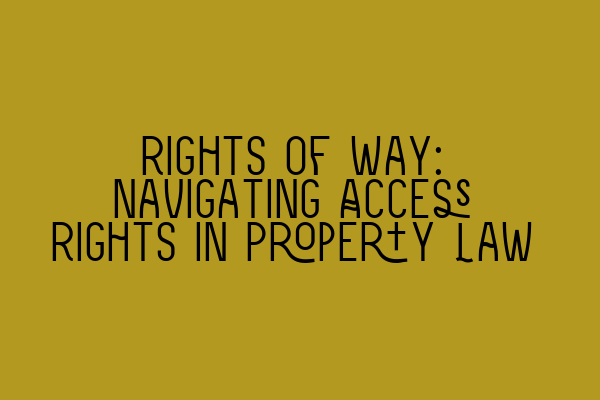Rights of Way: Navigating Access Rights in Property Law
As a property owner or buyer, understanding your rights of way is crucial for ensuring easy and hassle-free access to your property. Rights of way, also known as easements, can grant individuals or entities the legal right to pass through or use a portion of your land. These rights can significantly affect the value, usability, and enjoyment of your property. In this blog post, we will explore the intricacies of access rights in property law and provide you with essential information to navigate this aspect of property ownership.
What are Rights of Way?
In property law, a right of way is a legally recognized easement that permits someone to travel across your land or use a specific portion of it for a particular purpose. These rights are typically granted to neighboring properties or individuals who need access to their own land, a public road, or a common area.
There are several types of rights of way, including:
1. Public Rights of Way: These are access rights that are publicly owned and allow members of the public to pass over or through your land.
2. Private Rights of Way: These rights are granted to specific individuals or properties, usually neighboring landowners, to access their respective properties.
3. Prescriptive Rights: Prescriptive rights of way are acquired through continuous and unopposed use of a particular route or pathway over a considerable period. This can include public use or use by neighboring properties.
4. Easements by Necessity: These rights of way are created by law to ensure access to landlocked properties.
5. Easements by Grant: Easements by grant are created through a formal agreement, such as a deed or contract, between the parties involved. These easements are typically explicitly stated and recorded in the property’s title deeds.
The Importance of Understanding Rights of Way
Understanding your rights of way is essential for numerous reasons. Firstly, it allows you to determine who has permission to use your property and under what circumstances. This knowledge can help protect your privacy, security, and overall property value.
Secondly, being aware of the rights of way on or near your property can prevent potential legal disputes with neighbors or other individuals. You can ensure that any encroachments or unauthorized use of your land are addressed promptly and appropriately.
Furthermore, understanding rights of way can also be crucial when buying or selling a property. By examining the property’s title deeds and conducting a thorough investigation, you can determine the nature, extent, and limitations of any existing rights of way. This information allows you to make informed decisions about the property’s value, potential restrictions, and future development possibilities.
Navigating Rights of Way: Consult a Property Law Expert
Given the complexity and potential ramifications of rights of way, it is highly recommended to consult a property law expert when dealing with access rights. A solicitor with expertise in property law can provide invaluable guidance, ensuring that you understand your rights and obligations and that you navigate any potential disputes or issues effectively.
At SQE Property Law & Land Law, our team of experienced solicitors specializes in all aspects of property law. We can assist you in understanding and managing rights of way, whether you are a property owner seeking to protect your rights or a buyer looking for clarity before making a purchase.
In addition to seeking legal advice, it is also beneficial to familiarize yourself with relevant legal regulations and cases related to rights of way. By understanding the legal principles and precedents surrounding access rights, you can better advocate for your interests and avoid unnecessary conflicts.
Conclusion
Navigating rights of way in property law is essential for property owners and buyers alike. Understanding the types, implications, and legal principles surrounding access rights can help protect your property, prevent disputes, and ensure a smooth and enjoyable ownership experience.
If you require professional assistance in dealing with rights of way or any other aspect of property law, do not hesitate to contact SQE Property Law & Land Law. Our team of experts is here to provide you with the guidance and support you need.
Related Articles:
– SQE 1 Practice Exam Questions
– SQE 1 Practice Mocks FLK1 FLK2
– SQE 2 Preparation Courses
– SQE 1 Preparation Courses
– SRA SQE Exam Dates
